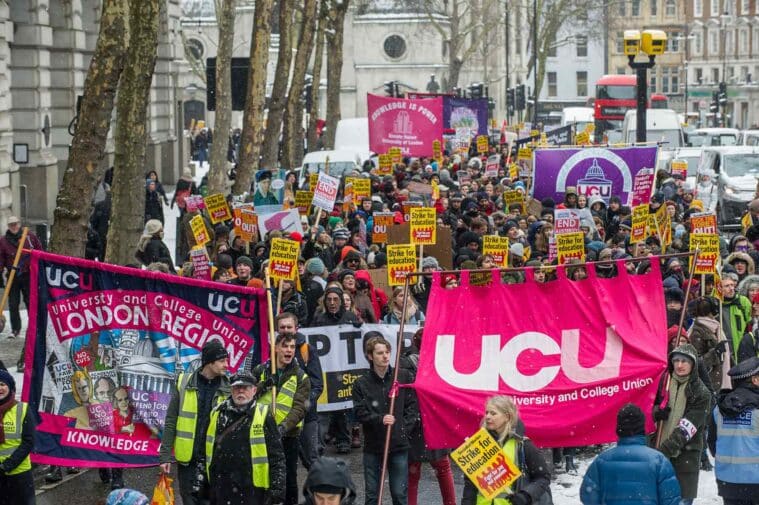

Up and down the country university workers are holding meetings and rallies to reject the proposed deal proposed between the UCU and university employers. Dozens of branches have already voted to reject the deal before a meeting of the union’s Higher Education Committee this afternoon.
The proposed deal agreed between the UCU and UUK is not a compromise – it is a capitulation.
Worse, it is a betrayal of a powerful strike movement which overcame the bosses’ attempts at divide and rule, to split the employers and throw them on the ropes.
The members could not have sent the union’s negotiators in with a stronger hand. But after six days of talks, they have emerged with a proposal to snatch defeat from the jaws of victory.
Even judged by the limited horizons of the current leadership of the British trade union movement, this is a bad deal.
After ten days of militant strike action, the ‘deal’ on offer is to accept some cuts now in return for a ‘review’ of the defined benefit scheme in three years’ time.
Further, the deal commits the UCU to asking lecturers to reschedule classes missed during strike action. Several universities threatened to dock teachers’ pay if they refused.
No lecturer or trade unionist could accept such insulting terms.
The response by university workers and their supporters has been angry and militant.
A majority of UCU branches that have met have voted to reject the deal.
The branch delegates’ meeting voted unanimously to reject the deal.
In London the union’s Higher Education Committee is due to meet and vote Tuesday afternoon. Hundreds of UCU members picketed the union HQ this morning, demanding no capitulation.
Many members are surprised – and angry – that the union has even proposed this deal. But it has provoked renewed determination to win this struggle.
If union leaders are allowed to capitulate without a fight from members, employers will ride roughshod not only over pensions, but will aggressively attack pay, conditions and quality of education across the whole front.
Thousands have joined the union during the strike, and thousands have sacrificed time, energy and money to stand up for working conditions – and learning conditions.
Members are clear that this deal should be rejected. If the union leadership capitulates, or tries to suspend action in order to ballot members on the deal, the power and initiative lies with rank and file members to continue and step up the action until the employers abandon their attacks.
This experience shows the importance of rank and file democratic reform of the union, which should start with placing control of disputes and strikes in the hands of a strike committee elected by and recallable to the branches.
But it also shows the importance of political leadership. During the strike Jeremy Corbyn and John McDonnell spoke out in support of the workers – breaking with Labour’s tradition of ‘neutrality’ in industrial disputes. This is welcome. But now the struggle has reached a crossroads, with members forced not only to fight the employers – but also their own leaders.
For too long Labour leaders have observed a non-aggression pact, never commenting on the “internal affairs” of the unions. But this struggle is a concern for the whole labour movement, particularly since it risks seeing a militant struggle sold out and hard-won rights handed away on a plate.
A defeat in this struggle would weaken trade unions and rank and file organisation everywhere. That’s why students have rallied to support the UCU in huge numbers and it’s why the trade union and Labour movement should move quickly, and decisively to back university workers in their struggle to deepen and win this fight.